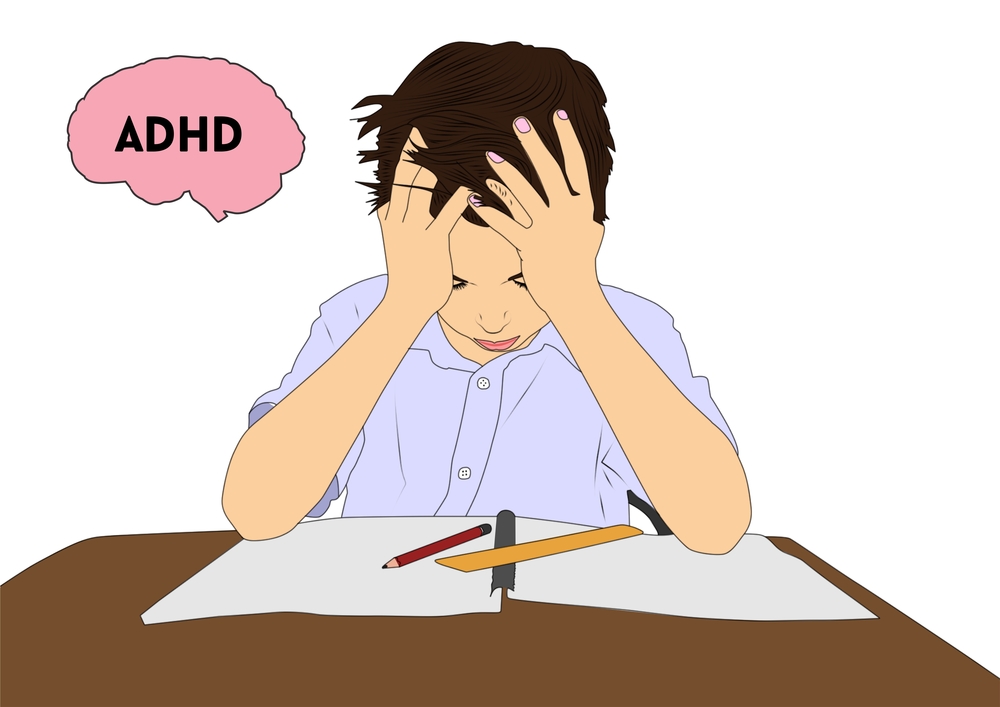In a new study, kids who received an ADHD diagnosis were compared with kids who had the same symptoms but who did not receive a diagnosis. Those who received a diagnosis had worse outcomes on five quality-of-life (QOL) measures and were more likely to engage in self-harm.
The researchers write, “These findings suggest that childhood ADHD diagnosis may not result in any improvements in quality of life measures in adolescents and may negatively impact some outcomes, such as the risk of self-harm.”
The study was led by Luise Kazda at the University of Sydney, Australia, and published in JAMA Network Open.
“Our study expands the current knowledge that children with ADHD often experience reduced QOL by showing that at least some of this is associated with the diagnosis itself,” the researchers write.
 The data came from the Longitudinal Study of Australian Children, which surveys a representative sample of the Australian population. None of the participants had an ADHD diagnosis at the beginning of the study. The study began when the kids were 6 or 7 years old, and the final data points came when they were 14 or 15.
The data came from the Longitudinal Study of Australian Children, which surveys a representative sample of the Australian population. None of the participants had an ADHD diagnosis at the beginning of the study. The study began when the kids were 6 or 7 years old, and the final data points came when they were 14 or 15.
At the endpoint, 393 adolescents had an ADHD diagnosis (72.2% male). They were matched on age, sex, and ADHD symptoms with 393 adolescents who did not receive an ADHD diagnosis.
Both groups scored about the same on almost all the measures of QOL, health, and happiness used by the researchers. But there were a few notable differences:
Those who received the diagnosis scored worse on feeling that they belonged at school and could succeed academically, having a sense of self-efficacy, and demonstrating negative social behaviors. Most concerningly, they had higher levels of self-harm.
In fact, kids who received the diagnosis of ADHD were 2.53 times more likely to harm themselves than kids who had the same level of ADHD symptoms but did not receive the diagnosis.
The researchers note that their study was observational, so causality could not be determined. However, they accounted for the level of ADHD symptoms—so they confirmed that the reduced quality of life and increased self-harm of those diagnosed are not due to the “underlying disorder,” as proponents of the ADHD diagnosis have often argued.
In conclusion, the researchers write:
“Unfortunately, our results indicate no beneficial associations of an ADHD diagnosis with adolescents’ QOL, which is highly concerning. It implies that the harms associated with an ADHD label (such as stigma, prejudice, deflection from other problems, or the perceived inability to change) may not be offset by benefits associated with the diagnosis or treatment. This is problematic, as it indicates that youths may be harmed by the diagnosis and that interventions to support them are not achieving the desired effect.”
Proponents of ADHD diagnosis and treatment argue that untreated ADHD negatively impacts kids’ lives. They suggest that treating ADHD symptoms can improve kids’ lives. However, previous research has not found such an effect. Instead, research has found that:
- Stimulant drugs like Adderall and Ritalin don’t actually improve kids’ academic performance and may even increase the likelihood of kids dropping out of school;
- Ritalin leads to an 18-fold increase in depression, which decreases back to baseline when kids stop taking the drug;
- Stimulants stunt growth and then rapidly lead to obesity; and
- Stimulants may lead to hallucinations and other psychotic experiences in 62.5% of kids.
Researchers have also consistently found that the youngest children in a classroom are far more likely to be diagnosed with ADHD and prescribed stimulant drugs, indicating that it is relative age—the relative immaturity of a 5-year-old compared to the 6-year-old right beside him—that accounts for many supposed “ADHD symptoms.”
The most well-regarded and highly cited study of childhood ADHD, the NIMH’s MTA study, found that, by the six-to-eight-year follow-up, those who received medication did no better than those who did not. Moreover, none of the treatments had been successful by that follow-up: the children who received treatment still scored worse than the normative comparison group on 91% of the measures they tested.
And in 2016, Keith Conners, who conducted the first tests of methylphenidate (Ritalin) and after whom the most-used ADHD rating scale is named, called our current use of the ADHD diagnosis “an epidemic of tragic proportions.”
****
Kazda, L., McGeechan, K., Bell, K., Thomas, R., & Barratt, A. (2022). Association of attention-deficit/hyperactivity disorder diagnosis with adolescent quality of life. JAMA Netw Open, 5(10), e2236364. doi:10.1001/jamanetworkopen.2022.36364 (Link)















This article is painfully relevent. ADHD was my gateway diagnosis. I was one of the drugged kids constantly made worse by stimulants. Without stimulants, I was calm, collected, smart, studious, sensitive and responsible.
In my teenage years, I had a stimulant-induced psychotic break, which hurled me into the world of “serious mental illness”. It is a sadistic industry.
Now that I survived well into my adulthood, I am extremely proud to be part of the whistle-blowing efforts by people like you. This information has the power to liberate and to restore dignity.
Great article. Thanks for your contributions
Report comment
“An epidemic of tragic proportions” … and the blog doesn’t even touch on all the ADHD children who were turned into the “bipolar” defamed.
Hey, I’ve got an idea, let’s stop neurotoxic poisoning the children.
Glad you survived, anotherone.
Report comment
Thank you! Fully agree. Also, they need to count the people who didn’t survive. I am way too young to have outlived so many. Every year, I get news that a former friend is now dead
Report comment
Report the stats on all those kids who switched from ADHD to BiPolar.
Report comment
Removed for moderation.
Report comment
“The incidence rate of bipolar disorder was 30 times higher in people with a prior diagnosis of ADHD and anxiety than people who weren’t diagnosed with either.”
https://www.healthline.com/health/adhd/adhd-and-bipolar
Stimulants can cause “bipolar” symptoms:
https://ajp.psychiatryonline.org/doi/10.1176/ajp.2006.163.7.1149
“The FDA notes that usual doses of stimulants like Adderall can cause psychotic or manic symptoms, like hallucinations, delusional thinking, or mania, in children. They also note aggressive behavior or hostility in children and adolescents with ADHD.”
https://cliffordsegil.com/this-is-how-adderall-really-affects-your-brain/
“Emergence of New Psychotic or Manic Symptoms
Treatment emergent psychotic or manic symptoms, e.g., hallucinations, delusional thinking, or mania in children
and adolescents without prior history of psychotic illness or mania can be caused by stimulants at usual doses. If
such symptoms occur, consideration should be given to a possible causal role of the stimulant, and
discontinuation of treatment may be appropriate. In a pooled analysis of multiple short-term, placebo-controlled
studies, such symptoms occurred in about 0.1% (4 patients with events out of 3482 exposed to methylphenidate
or amphetamine for several weeks at usual doses) of stimulant-treated patients compared to 0 in placebo-treated
patients. ”
https://www.accessdata.fda.gov/drugsatfda_docs/label/2007/011522s040lbl.pdf
Report comment
Removed for moderation
Report comment
Dear Peter
Thanks for drawing attention to this important and timely doctoral research by Luise Kazda at the University of Sydney.
One trusts that you/MIA staff might seek to contact the lead author Luise Kazda, for a podcast interview on her research.
*Amongst other questions you might ask in any future interview podcast – is whether university academics around the world, who are currently conducting human research on children already ‘diagnosed’ with ‘ADHD’ – need to undergo another (urgent) ethics committee check, for a risk that such research has caused or is causing now – disproportionate harm to child research participants who may have been misdiagnosed/over-diagnosed with ‘ADHD’ (so responsible decisions can be made as to whether such university research ought to approved or discontinued etc.)
https://acamh.onlinelibrary.wiley.com/doi/full/10.1111/jcpp.13700
Thanks.
Report comment
Removed for moderation.
Report comment
Removed for moderation.
Report comment
Phil Hickey is in ailing health, so he is no longer a regular poster here. Really uncool… Disgusting way to punch down, Bill
Report comment
Removed for moderation.
Report comment
“There is no variety of viewpoints here, Bob”
And that’s a real shame. Every forum should follow the example of Psychiatric Times and present a wide spectrum of views. For example, I love how Psychiatric Times devotes so much space to former psych patients to tell their stories about how their lives were destroyed by psychiatric “treatment”. I always flip right to the Psychiatric Survivor page when PT shows up in my mailbox!
Report comment
Removed for moderation.
Report comment
Not only are academic measures not improved, but not one significant outcome measure is better for those “treated” with stimulants vs. those diagnosed but not “treated.” This study shows that not only is there no benefit of long-term labeling and “treatment,” it actually makes kids’ lives measurably worse! Yet MILLIONS and MILLIONS of kids are getting labeled and “treated” every day. More proof that psychiatry not only doesn’t improve lives, it makes them worse, and despite doing so and KNOWING it is doing so, it makes no effort to change its theories or approaches.
Report comment
Snce the usual “treatments” for “ADHD” usually consist of using some form of prescription stimulant over a long period of time, it’s no surprise that none of the patients get any better at anything, except maybe hallucinating or expressing paranoid delusions.
Report comment
Indeed. Not sure how anyone could expect giving a street drug to little kids would be helpful to anyone but perhaps the adults handing the drugs to them.
Report comment
Removed for moderation.
Report comment
Removed for moderation.
Report comment
I worked with a child diagnosed with ADHD and who was on Ritalin. It took me a week to work out when a friend of his played up he did it more and that the young mainly female teachers didn’t know how to relate to a class of working class boys.
No one was interested.
Report comment
John, Good for you for seeing the truth. It probably did help him
I can speak from my own ‘lived experiences’ to say I am grateful for the many concerned laypeople who planted the seed that I was normal, good, and could one day be free. Still, the identified patient role cost so much. This whole industry is trash. If there is any chance my writing here can spare someone else, I can get value from all this garbage
Report comment
Removed for moderation.
Report comment
I agree with Keith Conners comment “an epidemic of tragic proportions.” The lack of a diagnostic hierarchy in the DSM, I believe is a large part of the reason. I address this issue in blogs 5.0 & 5.1 at https://medicalmodelredux.com/
Report comment
I would frame it more as a lack of any concrete means to MAKE a “diagnosis” from the DSM. As soon as you create “diagnoses” based on totally subjective “criteria,” the process of “diagnostic drift” will almost immediately take place. First, only the “really severe cases” are “diagnosed,” then the “benefits” to a less serious level of “dysfunction” are touted, and pretty soon, any kid who doesn’t want to sit still for yet ANOTHER round of math instruction on a point he already understood 3 months back is now “disordered” and “needs medication” for his “attentional difficulties.”
It also lets the adults off for creating poor environments for kids. I’d have had a lot less “attentional difficulties” if I weren’t bored to death all day every day throughout my entire tortured elementary school years. Why should the kids have to “pay attention” to whatever drivel the adults turn out? Maybe the adults suffer from “Boring Teacher Disorder!” It is exactly as logical and scientific!
Report comment
Removed for moderation.
Report comment
Dr. Yost, I do not know how to say this without sounding rude. I do not want to single you out because a large portion of your colleagues are the same. Your website reminds me of some of the discharge summaries I’ve seen in the past from psych. wards and psychiatrist talk. Full of dissecting the DSM, classifications of this and that, unipolar, pediatric bipolar, dysthymia, mixed states, better to classify this way, lessen this criteria, increase that criteria, blah blah.
Do you even understand the practical problems that people at the ground level have? How people are affected by psychiatric labelling (gaslighting, invalidation, coercion, control), how such labelling is weaponised, how psychiatric drugs often simply replace one problem with another, how becoming psychotic due to the side effects of a psychiatric drug are again relabelled with more serious psychiatric categorisations, the fact that people have spent resources, time and money (even hiring attorneys) and even shifted towns to escape all things psychiatry, the fact that many people don’t even seek medical treatment for physical problems because of what being stamped with psychiatric categorisations brings into their life (and the fact that they are not congruent with their truth), the fact that people have ended up in poverty, isolation, homeless or dead from “treatment”, the fact that people are spending years in “treatment” and are no better for it and are coming out as damaged as ever. This whole website is a testament to these things.
Honestly, I think so many of you guys live in a bubble of your own and have no idea of the realities of the common man (if you do, you haven’t expressed any of it on your website). Your debates and discussions seem to largely serve your psychiatrist-class whereas the whole point of your existence is supposedly to serve people.
I’ve seen your website. But perhaps you would understand a bit better if you read some articles like these from people with a wealth of life-experiences (and not simply psychiatric jibberish jargon):
i.) The Outing of a Consumer. ii.) Bipolar by Definition? iii.) On Being Forced Out in the Clinical Psychology Field.
Report comment
Registeredforthissite,
Thank you for this comment. It is so well said, and very validating to me and no doubt to other MIA readers who have experienced many of the negative outcomes of psychiatric intervention that you list. I have relocated to a different state for the reasons you allude to, and still I won’t seek out health care unless it’s a life-or-death situation because of the risk.
The professionals really do live in a bubble (or rather, the large majority seem to), just like you said.
Report comment
I know.
A lot of these people will never change. As long as we put out information, not so because we’re “preventing suffering people from seeking help” like they write (which is some reverse gaslighting), but because suffering people should get what actually is help for themselves and know what they’re getting into, and not the con the mental health industry puts out, at least some positive change will come out of it. Maybe one person with medical power will read about it somehow, somewhere and truly save and help one person. Maybe, that is some achievement, even if we get zero credit for it.
As far as people like you and me, we just have to absorb many of the losses we have faced in our lives.
Report comment
I agree completely!
Report comment
Well, one thing you probably do want to do with “hyperactive” kids, is take a hair or blood sample and test them for lead levels, as lead induces hyperactivity that obviously won’t respond to treatment with stimulants, no matter how much money the pharmaceutical company makes.
Report comment
Bcharris,
You make a good point with the lead. When I was young in the early 2000s, almost half of my grade year was diagnosed with ADHD. Most of my other friends had the diagnosis. The only non-ADHD diagnosed people were privileged outsiders with loving families- so no mainstreamers. Parents sought out ADHD diagnoses without prompting from schools. Sometimes, getting their child an ADHD diagnosis and stimulants was a status symbol
We also had normalized family violence, lead contamination, lead pipes and lead paint chips.
I recently found a series of articles confirming the high rates of diagnosed ADHD in the southeast, it was a profit machine in the early aughts. The psychs claimed an ADHD epidemic in leui of acknowledging our broken neoliberal culture and our poisoned environment.
Report comment
Removed for moderation.
Report comment
Excellent point, Steve (“diagnostic drift”). But, to me, reification is the more pernicious feature resulting from the ADD diagnosis. The distinction (at least as I think of it) is that “drift” speaks to the (unconscious) propensity/necessity to slap another/new diagnosis when the ADD “drug” treatment (cough, cough) fails; which, statistically, is all but a given. Reification, then, is the process resulting from “diagnostic drift’ by which the failure of the initial “treatment(s)” all but guarantee the failure of the next treatment iteration. Thus, the ADD kid bears the (complete) failure of the initial ADD diagnosis viz whatever myriad of familial, social (race, class, et al) “continue” being extensions of the southbound “diagnostic drift”.
I’m pretty sure you meant as much by drift? But I just wanted to make this distinction because reification is when diagnostic drift becomes “life consequences” resulting from an ADD diagnosis that, all things considered, should have taken a tract antithetical to the automaton, reflex-labeling and drugging tract to begin with (a whole other long winded topic). I apologize if I sound picky or prickly. But having lived a long life from an early childhood ADD “misdiagnosis”, I know this reductio ad absurdism ontic-space better than anyone should ever have to.
Report comment
“Diagnostic Drift” refers to when a soft line is drawn with no objective determination of who “has” or “doesn’t have” a particular condition, the line tends to move to include more and more people over time. This has been proven over and over again, particularly when there are incentives in place to “diagnose.” For “ADHD”, the incentives include explaining failure to be able to teach children or manage a classroom, justification for failing to learn sufficient parenting procedures, finding an “identified problem child” to maintain a dysfunctional family unit, creating a cadre of “specialist” who can make money off of making these “challenging diagnoses,” writing books and giving lectures, and of course, the financial remuneration for psychiatrists, doctors, and pharmaceutical companies.
And of course, you are correct, when “treating” something that hasn’t been actually established as a bona fide physiological problem and includes an incredibly heterogeneous group of “diagnosees,” one will certainly see “treatment failures” over and over again. And the soft “diagnostic criteria” of course make it easier to put the blame for any failures on the client instead of the person administering “treatment.” Instead of saying, “My treatment failed,” you can say “X is ‘treatment resistant,'” or “It’s really Bipolar Disorder” and off you go down another “treatment” path. I suppose that’s “reification” in action. We’re “treating” a metaphorical concept that is indistinguishable from “normalcy,” so the entire “treatment” process is by definition fantastical, having no concrete connection to reality. Except the damage done to the victims, oops, I mean “patients”, of course. That is very real and concrete, unfortunately.
Report comment
Well…you articulated way better what I tried to convey-and was actually thinking (soft drift the one exception because I was more focused on the challenges of the individual child). Thank you for taking the time to clarify by providing real life examples to my more generalized outlines.
FWIW: I found a fascinating interview between Sammi Timmi and Awais Aftab-in Psychiatric Times, March 12, 2021. I was blown away by Timmi’s professional and philosophical intelligence, of which didn’t come through (for me) in his book, “Insane Medicine”. I highly recommend this article to anyone faced with “having to” or otherwise considering medicating their ‘kid’ for ADD. Here’s a smidgen of that exchange:
Sammi Timmi:
” A 1-acronym formulation (such as ADHD) has powerful consequences. It acts as a hypnotic suggestion on those around the child and influences what they might view as important. It has the potential to obscure, or at least render as secondary, the things that might bolster the child’s esteem and the parent’s sense of empowerment.
I may choose an alternative label such as the child is “intense.” They engage with the world with an emotional intensity that provokes powerful emotions in those around them. We could see this as a gift that needs understanding, guidance, and nurturing, rather than using a label that views their behaviors as symptoms that need suppressing. With the cultural pressure to diagnose and medicate, this is not always easy, but maybe easier than we realize. In the last 5 years, I have started 1 child on stimulants, and although it helped ameliorate a dire situation in the short term, I do not think it has helped much in the long term. Much more common in my practice is to inherit young individuals on stimulants, where the perceived problems keep returning, but are now viewed through a medicalized lens leading down a one-way street of requests for increasing the dose or adding another medication in. Despite that, with time and patience, nearly every patient I inherit is off all stimulants by the time I discharge them at 18 years old, with their lives much improved”.
Report comment
Removed for moderation.
Report comment
I just want to correct the ignorant portion of my comment surrounding Insane Medicine and Dr. Timimi’s “professional and philosophical intelligence”. To be clear, Insane Medicine is, in my opinion, a brilliant and scathing moral and ethical work of courageous professionalism-which is why I bought its hardcover edition. What I meant to say is that Dr. Timimi’s conversation with Aftab was at another philosophical level. I correct this misrepresentation of Dr. Timimi’s book, Insane Medicine, as a matter of my sense of personal responsibility. My apologies here…
Report comment
I await a similar study on the effect of an autism diagnosis.
Report comment